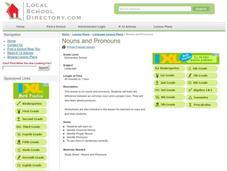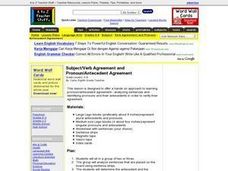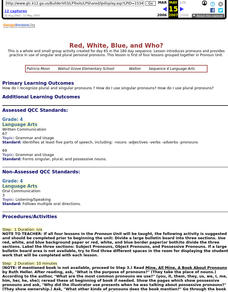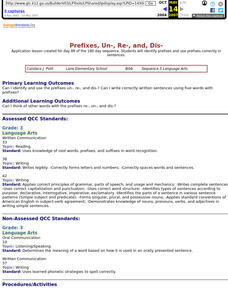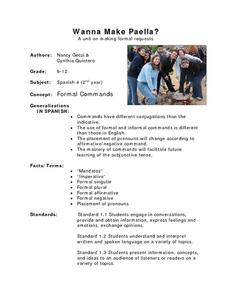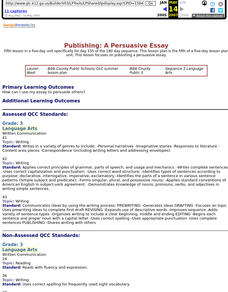Curated OER
Making Your Sentences Work: Subject-Verb Agreement
Review subject-verb agreement with your class. Demonstrate the different verb forms when the subject is singular, plural, compound, and an indefinite pronoun. Not too long, this presentation is nonetheless thorough, especially for...
Curated OER
Nouns and Pronouns
Young readers explore nouns and pronouns. They define what a noun is and highlight the nouns in given sentences. Learners are then introduced to pronouns, and identify them in simple sentences.
Curated OER
Intro to Pronouns
Sixth graders are able to identify personal pronouns and understand their function. They are able to use personal pronouns correctly as subjects and objects in sentences. Then they look at sentences given by the teacher, and they list...
Curated OER
Subject/Verb Agreement and Pronoun/Antecedent Agreement
Pronouns need to learn how to get along with their antededents. Learners practice making subject and verbs agree as well as pronouns and antecedents agree. They work together to analyze the sentences using legos. They know they are...
Curated OER
Subject and Verb Agreement
Students practice subject predicate agreement through the activities of this lesson. Selecting the correct verb to agree with the subject of the sentence is used in the preparation of documents, resumes, memos, letters, and presentations...
Curated OER
Subject-Verb Agreement Rules
In this subject verb agreement worksheet, young scholars read information about subject-verb agreement and then identify the correct verb in a sentence, practice using delayed subjects, and underline the verb that agrees with the subject...
Curated OER
Lesson 3: Subject and Verb Agreement: Singular Nouns and Pronouns He, She, It
In this subject and verb agreement worksheet, learners learn the rules for making the subject and verb agree when there is a singular noun: he, she, it. Students answer 25 questions.
Curated OER
"More Than One"
Help your class learn the spelling rule for adding -es to plural nouns and third-person singular verbs. The resource suggests using songs daily to reinforce the rules. The songs are contained in a Sing Your Way Through Phonics 2-CD set...
Curated OER
Understanding Pronouns
Students explore pronouns. In this English grammar lesson, students examine the use of personal pronouns and complete a worksheet regarding singular and plural personal pronouns.
Curated OER
Red, White, Blue, and Who?
Fourth graders are introduced to pronouns and provided practice in use of singular and plural personal pronouns.
Curated OER
Pronouns
Ninth graders define the term 'pronoun', differentiate between personal, possessive, interrogative, indefinite and demonstrative pronouns, and identify the eight parts of speech.
Curated OER
Parts of Speech: Nouns
Second graders discuss nouns. In this language arts lesson, 2nd graders discuss nouns and pronouns. Students identify various types of nouns on a worksheet. Students play "Popcorn" Nouns.
Curated OER
Living to Eat, Eating to Live
Young scholars develop a five paragraph essay.They write their essays, review rules related to subject/verb agreement and the use of transition words or devices. They find examples of transition words or devices in newspaper or...
Curated OER
Verb Sheet
Students complete template on the conjugation of any tense of verbs in Spanish, and then write teacher-dictated sentences using these verbs.
Curated OER
Nouns and Verbs and Proper Nouns, Oh My!
Second graders identify nouns and verbs in written communication. They distinguish between between nouns, proper nouns, and verbs. Students discuss the difference between these parts of speech. In partners, 2nd graders write a sentences...
Alabama Learning Exchange
Nouns, Verbs, and Describing Words
Second graders photograph items in their school and write a sentence that describes the items. They use different colored fonts when word processing the sentence to highlight nouns, verbs, and adjectives.
Curated OER
Happy Birthday Dr. Seuss!
Students read "Green Eggs and Ham" in celebration of Dr. Seuss's birthday and visit a storymaker website. Students create and type a three scene story using characters from Dr. Seuss's books and share their story with the class.
Curated OER
Wacky Web Tales
Students study the parts of speech and then review them. They identify each part of speech and place them on a tree map. Then they visit a website to create a "Wacky Web Tale" using information from the tree map. They print their tales...
Curated OER
Prefixes, Un-, Re-, and, Dis-
Third graders identify prefixes and use prefixes correctly in sentences. They edit and change sentences containing prefixes.
Curated OER
Whose Voice Do I Hear?
Fifth graders examine the power of voice in writing by completing a story using words following a particular voice. They take simple nursery rhymes, then attempt to put their own voice to a revised version. An interesting lesson on writing!
Curated OER
Making Formal Requests
Students investigate the concept of making formal requests and examples are included in the lesson for teacher presentation. They practice using the phrases in a variety of situations and then make presentations for others to hear.
Curated OER
Publishing: A Persuasive Essay
Third graders are given an opportunity to create a visual to accompany their presentations of their persuasive essays. They may use the computer or other media as resources.

